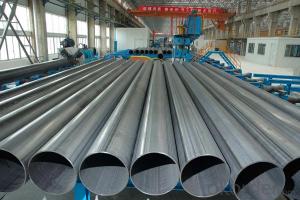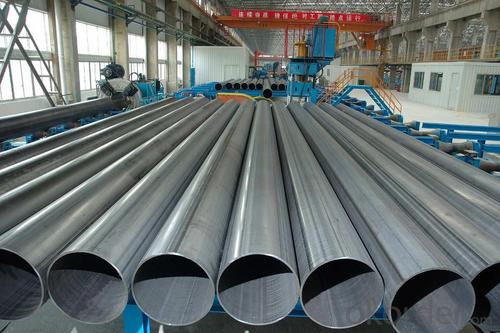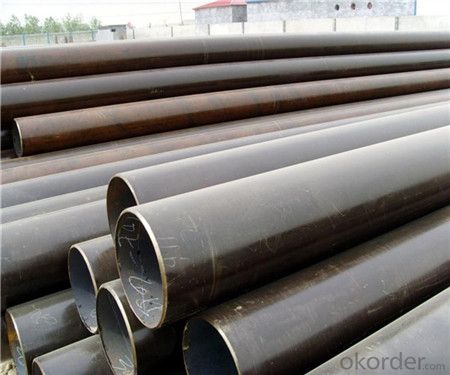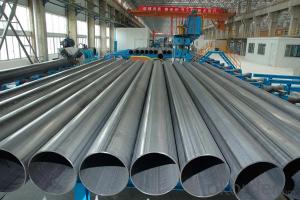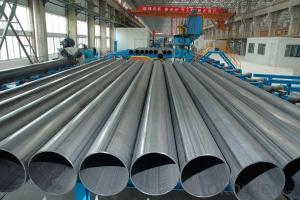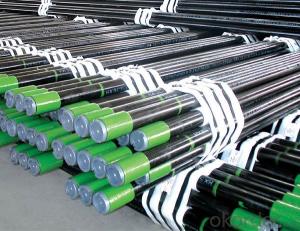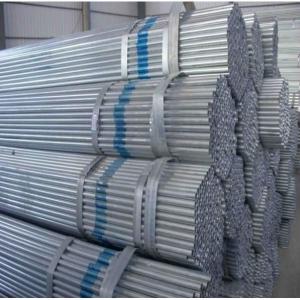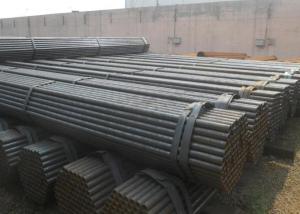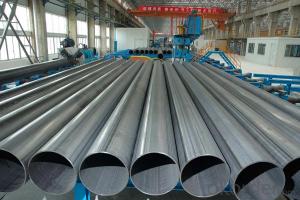ERW Steel Pipe JIS, DIN, ASTM, API Q195-Q345
- Loading Port:
- Tianjin
- Payment Terms:
- TT or LC
- Min Order Qty:
- 20 m.t.
- Supply Capability:
- 15000 m.t./month
OKorder Service Pledge
OKorder Financial Service
You Might Also Like
1、Structure of ERW Steel Pipe JIS, DIN, ASTM, API Q195-Q345:
Seamless pipe is formed by drawing a solid billet over a piercing rod to create the hollow shell. As the manufacturing process does not include any welding, seamless pipes are perceived to be stronger and more reliable. Historically seamless pipe was regarded as withstanding pressure better than other types, and was often more easily available than welded pipe.
2、Main Features of ERW Steel Pipe JIS, DIN, ASTM, API Q195-Q345:
• High manufacturing accuracy
• High strength
• Small inertia resistance
• Strong heat dissipation ability
• Good visual effect
• Reasonable price
3、ERW Steel Pipe JIS, DIN, ASTM, API Q195-Q345 Specification:
Standard | GB, DIN, ASTM ASTM A106-2006, ASTM A53-2007 |
Grade | 10#-45#, 16Mn 10#, 20#, 45#, 16Mn |
Thickness | 8 - 33 mm |
Section Shape | Round |
Outer Diameter | 133 - 219 mm |
Place of Origin | Shandong, China (Mainland) |
Secondary Or Not | Non-secondary |
Application | Hydraulic Pipe |
Technique | Cold Drawn |
Certification | API |
Surface Treatment | factory state or painted black |
Special Pipe | API Pipe |
Alloy Or Not | Non-alloy |
Length | 5-12M |
Outer Diameter | 21.3-610mm |
Grade | 20#, 45#, Q345, API J55, API K55, API L80, API N80, API P110, A53B |
Standard | ASME, ASTM |
1) Material:20#(ASTM A 106/A53 GRB.API5LGRB,GB),45#,16Mn,10#.
2) Specification range:OD:21.3-610mm,WT:6-70mm,length:6-12m or according to the requirement of clients.
3) Excutive standards:GB,ASME API5L.ASTM A 106/A53,Despite of the above standards,we can also supply seamless steel pipe with standard of DIN,JIS,and so on,and also develop new products according to the requirements of our clients!
4) Surface:black lacquered,varnish coating or galvanized.
5) Ends:Beveled or square cut,plastic capped,painted.
6) Packing:bundles wrapped with strong steel strip,seaworthy packing.
4、Packaging & Delivery
Packaging Details: | seaworthy package,bundles wrapped with strong steel strip |
Delivery Detail: | 15-30days after received 30%TT |
5、FAQ of ERW Steel Pipe JIS, DIN, ASTM, API Q195-Q345:
①How is the quality of your products?
Our products are manufactured strictly according to national and internaional standard, and we take a test
on every pipe before delivered out. If you want see our quality certifications and all kinds of testing report, please just ask us for it.
Guaranteed: If products’ quality don’t accord to discription as we give or the promise before you place order, we promise 100% refund.
②How about price?
Yes, we are factory and be able to give you lowest price below market one, and we have a policy that “ for saving time and absolutely honest business attitude, we quote as lowest as possible for any customer, and discount can be given according to quantity”,if you like bargain and factory price is not low enough as you think, just don’t waste your time.Please trust the quotation we would give you, it is professional one.
③Why should you chose us?
Chose happens because of quality, then price, We can give you both.Additionally, we can also offer professional products inquiry, products knowledge train(for agents), smooth goods delivery, exellent customer solution proposals.Our service formula: good quality+good price+good service=customer’s trust
SGS test is available, customer inspection before shipping is welcome, third party inspection is no problem.
6、ERW Steel Pipe JIS, DIN, ASTM, API Q195-Q345 Images:
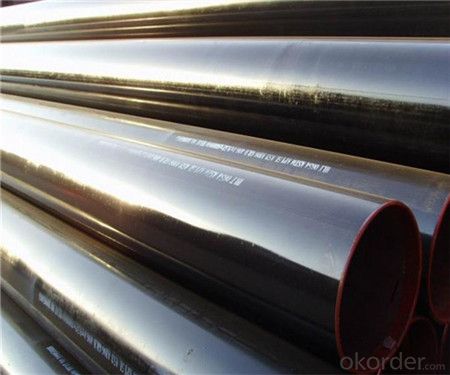
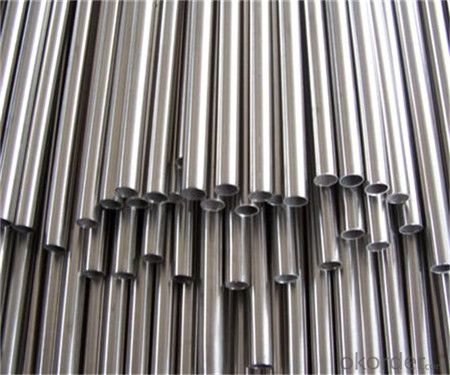
- Q: What are the advantages of using pre-fabricated steel pipes?
- Using pre-fabricated steel pipes in various applications has several advantages. Firstly, these pipes offer a high level of durability and strength due to the robustness and resistance of steel to external forces. This makes them ideal for withstanding high pressure or heavy loads, resulting in a longer lifespan compared to other materials and reducing the need for frequent replacements and maintenance. Secondly, pre-fabricated steel pipes provide excellent corrosion resistance by being coated with protective layers like galvanization or epoxy, preventing rusting and corrosion. This is especially important in industries or environments where the pipes may come into contact with moisture, chemicals, or other corrosive substances. By utilizing pre-fabricated steel pipes, the risk of leaks, deterioration, or failure due to corrosion is significantly reduced. Another advantage of these pipes is their versatility and ease of installation. They are manufactured to precise specifications before being delivered to the site, allowing for quick and efficient installation. Their modular nature enables easy assembly, disassembly, and reconfiguration, making them suitable for a wide range of applications. Additionally, pre-fabricated steel pipes can be seamlessly integrated with other building components, reducing installation time and costs. Furthermore, pre-fabricated steel pipes are more environmentally friendly compared to other materials. Steel is highly recyclable, and using pre-fabricated pipes reduces the consumption of natural resources and energy required for production. The long lifespan of steel pipes also reduces waste generation and the need for frequent replacements, contributing to sustainability efforts. Lastly, pre-fabricated steel pipes offer cost advantages. Although the initial cost may be higher than some other materials, their durability and low maintenance requirements result in long-term cost savings. The reduced need for repairs, replacements, and maintenance, along with the ease of installation, lead to lower overall project costs and reduced downtime. In summary, the advantages of pre-fabricated steel pipes include durability, corrosion resistance, versatility, ease of installation, environmental friendliness, and cost-effectiveness. These benefits make them the preferred choice for various industries and applications.
- Q: What is the average lifespan of steel pipes in different applications?
- The average lifespan of steel pipes in different applications can vary depending on various factors such as the quality of the steel, the environment in which the pipes are used, and the maintenance and care they receive. In general, steel pipes used for water supply lines can have an average lifespan of around 50 to 70 years. This is because these pipes are typically made of high-quality steel and are subject to less corrosive environments. However, factors such as water chemistry, soil conditions, and the presence of corrosive substances can significantly influence the lifespan of these pipes. For steel pipes used in industrial applications such as oil and gas pipelines, the average lifespan can range from 20 to 50 years. These pipes are exposed to more aggressive environments, including high temperatures, pressure, and corrosive substances. Regular inspection, maintenance, and corrosion protection measures can help extend their lifespan. In construction applications, steel pipes used for structural purposes can have an average lifespan of 50 to 100 years or more. These pipes are typically designed to withstand heavy loads and are often protected by coatings or insulation to prevent corrosion. It's important to note that these are average lifespans and individual pipes may have shorter or longer lifespans depending on the specific conditions they are exposed to. Regular inspections, maintenance, and timely repairs or replacements when necessary can help ensure the longevity of steel pipes in different applications.
- Q: Can steel pipes be used for steam applications?
- Yes, steel pipes can be used for steam applications. Steel is a widely used material in steam systems due to its high strength, durability, and resistance to high temperatures and pressure. It is commonly used in industries such as power generation, refineries, and petrochemical plants for carrying and distributing steam. However, it is important to ensure that the steel pipes are properly designed, installed, and maintained to withstand the specific conditions and requirements of steam applications.
- Q: Can steel pipes be used for underground sewage systems?
- Yes, steel pipes can be used for underground sewage systems. Steel pipes are known for their durability and strength, making them suitable for underground applications. However, it is essential to ensure that the steel pipes are properly coated or protected against corrosion to prevent damage from sewage and soil conditions.
- Q: How do you prevent corrosion in steel pipes?
- One effective way to prevent corrosion in steel pipes is by applying a protective coating, such as paint or epoxy, to the surface of the pipes. This barrier creates a physical barrier between the pipe and the surrounding environment, preventing moisture and corrosive agents from coming into direct contact with the steel. Additionally, regular inspection and maintenance of the pipes, including cleaning and repairing any damaged coating, can help identify and address potential issues before they lead to corrosion.
- Q: What are the different types of steel pipe valves?
- There are several different types of steel pipe valves that are commonly used in various industries and applications. Here are some of the most common types: 1. Gate valves: These valves are designed to control the flow of fluid by lifting or lowering a gate or wedge that obstructs the flow path. They provide a tight seal when closed and are commonly used in applications that require a full flow or complete shut-off. 2. Globe valves: Globe valves have a globe-shaped body and a movable plug or disc that regulates the flow of fluid. They offer good throttling capabilities and are used in applications where precise control of flow is required. 3. Ball valves: Ball valves use a rotating ball with a hole in it to control the flow of fluid. When the hole is aligned with the pipe, the valve is fully open, and when the hole is perpendicular to the pipe, the valve is closed. Ball valves are durable, reliable, and commonly used in applications that require quick and easy shut-off. 4. Check valves: Check valves allow fluid to flow in only one direction and prevent backflow. They are often used to prevent damage to pumps, compressors, and other equipment by preventing reverse flow. 5. Butterfly valves: Butterfly valves have a disc that rotates within the pipe to control the flow of fluid. They are lightweight, compact, and offer a quick shut-off. Butterfly valves are commonly used in large-scale applications such as water treatment and HVAC systems. 6. Plug valves: Plug valves have a cylindrical or conical plug that rotates within the valve body to control flow. They are simple in design, easy to operate, and offer reliable shut-off capabilities. Plug valves are commonly used in applications that require frequent operation and high pressure ratings. 7. Diaphragm valves: Diaphragm valves use a flexible diaphragm to control the flow of fluid. When the diaphragm is pressed against the valve seat, the flow is blocked, and when the diaphragm is lifted, the flow is allowed. Diaphragm valves are commonly used in applications that require a sterile or hygienic environment. These are just a few examples of the different types of steel pipe valves available in the market. The choice of valve depends on the specific application requirements, such as flow rate, pressure, temperature, and the type of fluid being transported.
- Q: What are the different types of steel pipe elbows?
- There are several different types of steel pipe elbows, including 45-degree elbows, 90-degree elbows, and 180-degree elbows. These elbows are used to change the direction of the flow in a piping system and are available in various sizes and materials to suit different applications and requirements.
- Q: Is it good to buy a simple wardrobe or a steel pipe?
- Therefore, the simple solid wood wardrobe and steel pipe wardrobe is good or bad, according to personal preferences to set, and that environmental protection seems to have grades, easy to crack
- Q: How are steel pipes coated for underground applications?
- Steel pipes for underground applications are typically coated using a process called fusion bonded epoxy (FBE) coating. This involves applying a special epoxy powder coating to the surface of the steel pipe and then heating it to fuse the coating into a smooth and durable finish. The FBE coating provides excellent corrosion resistance and protects the steel pipe from the harsh underground environment.
- Q: Can steel pipes be used for steam systems?
- Yes, steel pipes can be used for steam systems. Steel pipes are commonly used in steam systems due to their durability, high temperature resistance, and ability to handle high pressure.
Send your message to us
ERW Steel Pipe JIS, DIN, ASTM, API Q195-Q345
- Loading Port:
- Tianjin
- Payment Terms:
- TT or LC
- Min Order Qty:
- 20 m.t.
- Supply Capability:
- 15000 m.t./month
OKorder Service Pledge
OKorder Financial Service
Similar products
Hot products
Hot Searches
Related keywords
